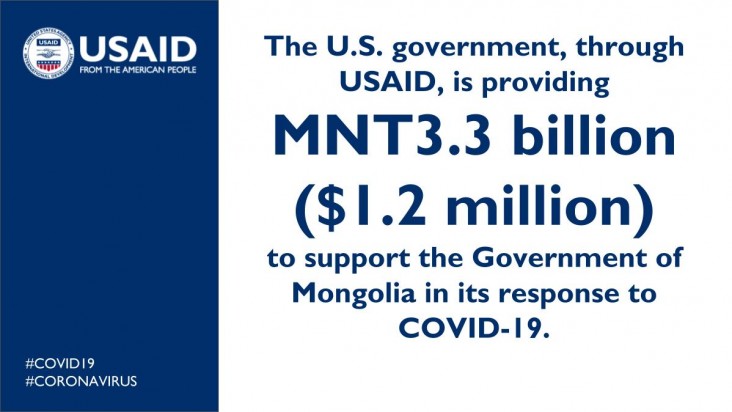Press Release Shim
Speeches Shim

For Immediate Release
The U.S. Embassy in Mongolia announced today that the U.S. Government has committed more than MNT3.3 billion ($1.2 million) to support the Government of Mongolia in its response to COVID-19 in the country. The U.S. Government, through the U.S. Agency for International Development (USAID), will collaborate with the Mongolian Ministry of Health (MOH), World Health Organization (WHO), and UNICEF to strengthen infection prevention and control.
U.S. assistance will support the MOH to enhance risk communication and community preparedness, provide critical supplies, improved water, sanitation, and hygiene (WASH) services, and assist with data collection and analysis. USAID programs will also help the Ministry of Health protect healthcare providers and patients, expand laboratory testing capabilities, conduct outbreak surveillance, and provide quality patient care.
“The United States is proud to have Mongolia as a Strategic Partner, and this assistance today is a clear demonstration of our unwavering cooperation,” said U.S. Ambassador Michael S. Klecheski. “As a friend and third neighbor, the United States will continue to stand by the people of Mongolia in these challenging times.”
Dr. Sergey Diorditsa, WHO representative to Mongolia, thanked USAID for the assistance: “This is clear evidence of effective collaboration to strengthen efforts in preparedness and response to COVID-19.” Dr. Sergey said this funding will greatly enhance WHO’s efforts to support the Ministry of Health and medical services to contain and mitigate the spread of COVID-19 in Mongolia.
The United States has been the world’s largest provider of assistance in public health. American taxpayers have generously made available more than $90 billion, through USAID and the U.S. Department of State, over the last decade to save lives, protect people who are most vulnerable to disease, and promote the stability of communities and nations around the world. USAID’s investments have helped improve surveillance for deadly pathogens, strengthened laboratory systems, and refined risk-communications; funded the response to outbreaks of deadly illnesses; and addressed the rising threat of antimicrobial resistance.

Comment
Make a general inquiry or suggest an improvement.